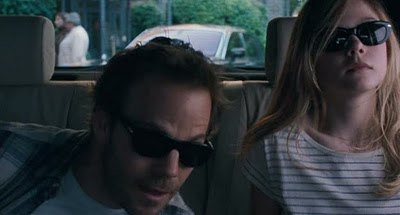The Beguiled official teaser trailer, related links, notes on Somewhere (2010)
Looking forward to this by one of my favorite directors:
Related links:
"8 Questions about A Very Murray Christmas"
"The lifestyle everybody kinda wants": The Bling Ring"
more Sofia Coppola links
Also, some notes on Somewhere (2010):
1) After watching Somewhere, I mostly remember Johnny Marco's (Stephen Dorff's) J. Crew boots. His sense of style has a deadbeat working class stoner aesthetic that reminds me of the guys who wore lots of flannel and jeans back in high school. He wears one expensive Red Wing boot untied and dangling, the other underneath the jean leg as he stumbles about from his black Alfa Romeo to his Chateau Marmont suite in his stubbled sun-struck LA Bret Easton Ellis celebrity-decadent world. In some ways, Somewhere is a more faithful low-key version of Ellis's Less Than Zero than the incoherent 1987 movie version starring Robert Downey Jr. Marco is so jaded with movie star fame, he passes out as Playboy dancers gyrate on stripper poles in from of him, or he zonks out snoring in the midst of undressing another woman during a party. Often as not, he's asleep when he's not sitting on a sofa and staring blankly into space with an opened Corona in one hand.
2) If Johnny didn't have Stephen Dorff's charm and Elle Fanning as Cleo, his daughter, needing his parental attention, he would be an insufferably blank self-involved poltroon.
3) As he sinks deeper into his characteristic stupor, one thing becomes clear: in Sofia's films, sex is always the enemy because it falsifies what little authenticity that can exist between wealthy, famous folk. As an alternative, she prefers to depict two people seeking an innocent prelapsarian playfulness amidst all of the adult fakery. In Lost in Translation, Bob asks Charlotte if she wants to escape from the insufferable Park Hyatt Tokyo Hotel, and to some extent, by dashing aimlessly around the city and laughing cruelly at the phonies like Kelly (Anna Faris), they succeed. But Coppola's vision requires that she persuade her relatively poor audience to become just as alienated from this super-rich world as she is (not an easy thing to cajole us into). In Somewhere, I think we are meant to admire Johnny's decadent lifestyle even as it proves hollow, with awkward overly long shots emphasizing his boredom and his race car running in circles. Only his fatherly obligation makes him rise above his besotted hedonism on rare occasions. Still, to share in his alienation still seems like asking a lot.

4) Somewhere left me wondering about Sofia Coppola's growing self-consciousness as an artist, her willingness to repeat herself by showing what she, as Francis Ford Coppola's daughter, could know about: the Eloise-like milieu of award ceremonies, photo-ops, and top-notch Italian hotel suites with swimming pools. When we see the hungover Johnny watch Chloe ice-dance to Gwen Stefani's "Cool," the moment comes off as too self-consciously pure after all of Johnny's recent decadence. Johnny is such a bonehead, we can't even tell if he can properly appreciate his daughter's ministrations on his behalf (Chloe comes across as unfairly smarter and more mature than her dad). At one point, she attempts to domesticate his hotel room by ordering a cheese grater to help fix some macaroni and cheese. Later, Chloe shows off her artistic bent by fixing him some gourmet-quality Eggs Benedict, complete with chives garnish cut with kitchen shears. But, even given these moments of grace, where does Johnny have to go with his life? We never once see him read a book, or show much cultural interest in anything. He's a docile puppet of the publicity machine.
5) My issues with Johnny reminded me of Pauline Kael's problems with Benjamin Braddock in her review of The Graduate (and both films share a tendency to have lingering shots of their hero drifting around a pool). If Ben had any ideas, we would hate him, but as long he remains blank, the audience can project what they like on him, but Ben is eventually defined by his rejection of the rich California lifestyle of his parents while Johnny embraces it. And in contrast to Bill Murray's expert depiction of a midlife crisis in Lost in Translation, there's no tension in Johnny's befuddled acceptance of the perks of his job. Meanwhile, Johnny's Los Angeles mise-en-scene is too close to that of Bret Easton Ellis's recent The Informers for comfort. When Johnny finally removes his sated mask of cool and cries while on the phone with his publicist (I think), late in Somewhere, he says "I'm f---ing nothing." A sad scene, but after spending so much of the movie looking disaffected, Johnny's moment of vulnerability has little effect.

6) What I wrote about The Informers also applies to Somewhere: "the problem with all of Ellis' depictions of youthful narcissism and Play It As It Lays-Joan Didion-esque `deep' posturing (with everyone endlessly lighting cigarettes and gazing with apathy off into the distance) lies in his difficulty in making anyone care about these characters who certainly do not care about each other. Moreover, this aesthetic based on youth does not age well." To be fair, Johnny's relationship with Chloe redeems him a little, and Somewhere is light years better than The Informers in terms of craft. It just strikes me that Sofia Coppola is capable of creating so much more.

2) If Johnny didn't have Stephen Dorff's charm and Elle Fanning as Cleo, his daughter, needing his parental attention, he would be an insufferably blank self-involved poltroon.
3) As he sinks deeper into his characteristic stupor, one thing becomes clear: in Sofia's films, sex is always the enemy because it falsifies what little authenticity that can exist between wealthy, famous folk. As an alternative, she prefers to depict two people seeking an innocent prelapsarian playfulness amidst all of the adult fakery. In Lost in Translation, Bob asks Charlotte if she wants to escape from the insufferable Park Hyatt Tokyo Hotel, and to some extent, by dashing aimlessly around the city and laughing cruelly at the phonies like Kelly (Anna Faris), they succeed. But Coppola's vision requires that she persuade her relatively poor audience to become just as alienated from this super-rich world as she is (not an easy thing to cajole us into). In Somewhere, I think we are meant to admire Johnny's decadent lifestyle even as it proves hollow, with awkward overly long shots emphasizing his boredom and his race car running in circles. Only his fatherly obligation makes him rise above his besotted hedonism on rare occasions. Still, to share in his alienation still seems like asking a lot.
5) My issues with Johnny reminded me of Pauline Kael's problems with Benjamin Braddock in her review of The Graduate (and both films share a tendency to have lingering shots of their hero drifting around a pool). If Ben had any ideas, we would hate him, but as long he remains blank, the audience can project what they like on him, but Ben is eventually defined by his rejection of the rich California lifestyle of his parents while Johnny embraces it. And in contrast to Bill Murray's expert depiction of a midlife crisis in Lost in Translation, there's no tension in Johnny's befuddled acceptance of the perks of his job. Meanwhile, Johnny's Los Angeles mise-en-scene is too close to that of Bret Easton Ellis's recent The Informers for comfort. When Johnny finally removes his sated mask of cool and cries while on the phone with his publicist (I think), late in Somewhere, he says "I'm f---ing nothing." A sad scene, but after spending so much of the movie looking disaffected, Johnny's moment of vulnerability has little effect.



Comments